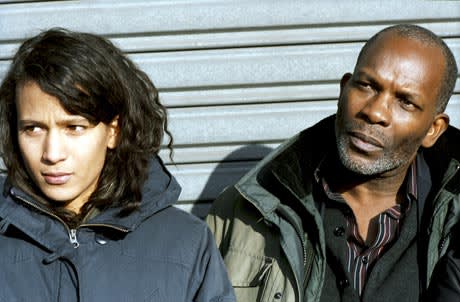In a sense, 35 Rhums is a film thats been made many times: its an urban slice of life involving a family with divided loyalties. But never before has it been made by Claire Denis, who corrects all the poky limitations of that subgenre to make something thats a pure, loose-limbed pleasure.
At first, the Paris-set movie is a little rougher than the directors usual. The story of a black subway driver father (Denis regular Alex Descas) and his college age daughter (Mati Diop), it risks literal mindedness with some clunky exposition and direct didacticism. But then it settles into a groove involving relationships for both, most notably the weirdo white guy (Gregoire Colin) the daughter is seeing.
Theres not much to define the rise and fall of relationships here but thats the point: Denis isnt interested in forcing a point of view on these people, just watching the ebb and flow of life. And when bad things happen its less dramatic high point than momentary lapse on the way to the next event.
In the hands of any other director, this would have been intolerable, because they would have shoehorned the rich characters and environment into a narrative that made it "mean something. However, the results here are more suggestive than conclusive, and you breathe a sigh of relief that you havent been bulled like in so many other movies.
With its train symbolism and family changes, the film has been compared to Ozu; its less polite and less polished while being just as studied, graceful and humane.
A Denis film is usually an event, and while this isnt her best, her second-rate works are usually better than most peoples best. Miss it at your peril.
(Soudaine Compagnie)At first, the Paris-set movie is a little rougher than the directors usual. The story of a black subway driver father (Denis regular Alex Descas) and his college age daughter (Mati Diop), it risks literal mindedness with some clunky exposition and direct didacticism. But then it settles into a groove involving relationships for both, most notably the weirdo white guy (Gregoire Colin) the daughter is seeing.
Theres not much to define the rise and fall of relationships here but thats the point: Denis isnt interested in forcing a point of view on these people, just watching the ebb and flow of life. And when bad things happen its less dramatic high point than momentary lapse on the way to the next event.
In the hands of any other director, this would have been intolerable, because they would have shoehorned the rich characters and environment into a narrative that made it "mean something. However, the results here are more suggestive than conclusive, and you breathe a sigh of relief that you havent been bulled like in so many other movies.
With its train symbolism and family changes, the film has been compared to Ozu; its less polite and less polished while being just as studied, graceful and humane.
A Denis film is usually an event, and while this isnt her best, her second-rate works are usually better than most peoples best. Miss it at your peril.
